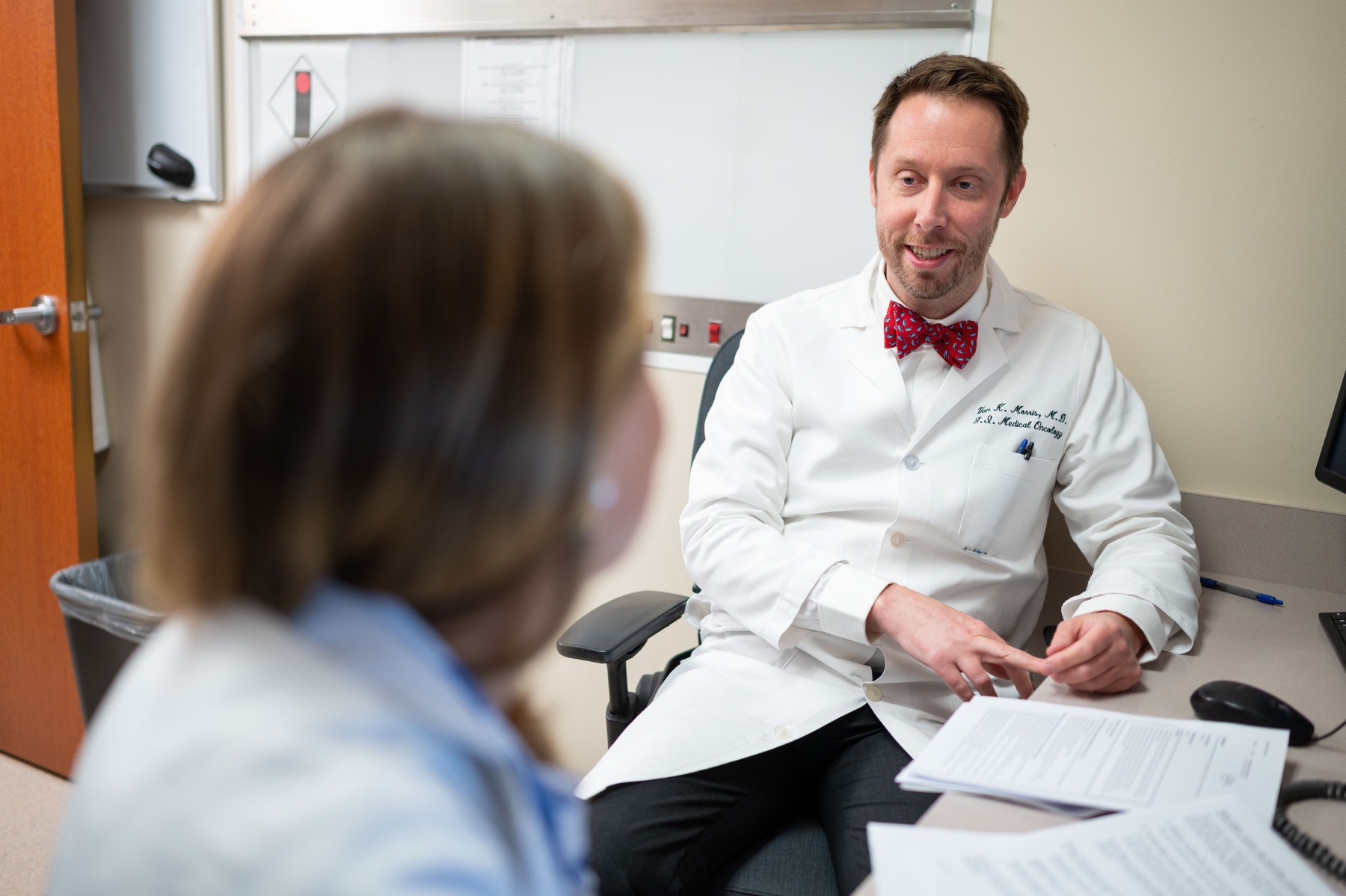- Diseases
- Acoustic Neuroma (14)
- Adrenal Gland Tumor (24)
- Anal Cancer (68)
- Anemia (2)
- Appendix Cancer (16)
- Bile Duct Cancer (26)
- Bladder Cancer (72)
- Brain Metastases (28)
- Brain Tumor (232)
- Breast Cancer (714)
- Breast Implant-Associated Anaplastic Large Cell Lymphoma (2)
- Cancer of Unknown Primary (4)
- Carcinoid Tumor (8)
- Cervical Cancer (160)
- Colon Cancer (166)
- Colorectal Cancer (118)
- Endocrine Tumor (4)
- Esophageal Cancer (44)
- Eye Cancer (36)
- Fallopian Tube Cancer (8)
- Germ Cell Tumor (4)
- Gestational Trophoblastic Disease (2)
- Head and Neck Cancer (12)
- Kidney Cancer (128)
- Leukemia (342)
- Liver Cancer (50)
- Lung Cancer (286)
- Lymphoma (278)
- Mesothelioma (14)
- Metastasis (30)
- Multiple Myeloma (100)
- Myelodysplastic Syndrome (60)
- Myeloproliferative Neoplasm (6)
- Neuroendocrine Tumors (16)
- Oral Cancer (100)
- Ovarian Cancer (172)
- Pancreatic Cancer (160)
- Parathyroid Disease (2)
- Penile Cancer (14)
- Pituitary Tumor (6)
- Prostate Cancer (146)
- Rectal Cancer (58)
- Renal Medullary Carcinoma (6)
- Salivary Gland Cancer (14)
- Sarcoma (238)
- Skin Cancer (296)
- Skull Base Tumors (56)
- Spinal Tumor (12)
- Stomach Cancer (64)
- Testicular Cancer (28)
- Throat Cancer (92)
- Thymoma (6)
- Thyroid Cancer (98)
- Tonsil Cancer (30)
- Uterine Cancer (82)
- Vaginal Cancer (18)
- Vulvar Cancer (20)
- Cancer Topic
- Adolescent and Young Adult Cancer Issues (20)
- Advance Care Planning (10)
- Biostatistics (2)
- Blood Donation (18)
- Bone Health (8)
- COVID-19 (362)
- Cancer Recurrence (120)
- Childhood Cancer Issues (120)
- Clinical Trials (632)
- Complementary Integrative Medicine (22)
- Cytogenetics (2)
- DNA Methylation (4)
- Diagnosis (232)
- Epigenetics (6)
- Fertility (62)
- Follow-up Guidelines (2)
- Health Disparities (14)
- Hereditary Cancer Syndromes (126)
- Immunology (18)
- Li-Fraumeni Syndrome (8)
- Mental Health (116)
- Molecular Diagnostics (8)
- Pain Management (62)
- Palliative Care (8)
- Pathology (10)
- Physical Therapy (18)
- Pregnancy (18)
- Prevention (920)
- Research (392)
- Second Opinion (74)
- Sexuality (16)
- Side Effects (606)
- Sleep Disorders (10)
- Stem Cell Transplantation Cellular Therapy (216)
- Support (402)
- Survivorship (322)
- Symptoms (182)
- Treatment (1786)
Life after colorectal cancer for young adult survivors
BY Devon Carter
4 minute read | Published March 10, 2017
Medically Reviewed | Last reviewed by an MD Anderson Cancer Center medical professional on March 10, 2017
A growing number of adults under age 50 are facing colorectal cancer, and while cancer at any age brings lifestyle changes, these changes can be especially challenging for those who are just starting their careers, dating, thinking about becoming parents, or caring for kids or aging parents.
That’s because colorectal cancer treatment — often surgery plus chemotherapy or radiation — can impact everything from bathroom use to fertility to mental health.
We spoke with Y. Nancy You, M.D., about what young colorectal cancer survivors can expect and the best ways to cope. Here’s what she had to say.
Bathroom use after colorectal cancer treatment
If the tumor is too low to allow for the digestive tract to be reconnected after surgery, colorectal cancer patients may end up with a new waste collection method that uses an external pouch, called an ostomy.
“I always tell people once they get over having an ostomy, they can live their lives as they did before. You can swim. You can run a marathon. You’ll absorb the same nutrients, and you won’t get an infection around port,” You says.
Even patients with only a temporary bag can expect to make adjustments to their lifestyle. “Losing part of the rectum has significant functional implications because there’s loss of storage capacity and sometimes control. It’s also possible to have urgency, frequency and predictability concerns. Your care team will help you adjust and work through those issues,” You says.
Sex after colorectal cancer treatment
About 30% of men who undergo surgery and radiation as part of their colorectal cancer treatment will have some change in their sexual function.
“We preserve nerves in the pelvis as much as we can, but with radiation to nerve tissue, moving things during surgery and with scarring, the patients will notice changes,” You says. “Complaints are typically along the lines of the erection not being as firm. Some men can also have retrograde ejaculation, which means the semen gets ejaculated back into the bladder. It can be uncomfortable.”
While more research about female sexual function is needed, You says women’s sexual complaints after colorectal cancer treatment can include vaginal dryness and discomfort. Patients shouldn’t be shy about discussing their concerns with their doctor.
“For patients who continue to experience sexual difficulty, we recommend them to colleagues in Psychiatry and in Urology, so that the psychological and the organic aspects of sexual function can be addressed,” she says.
Fertility after colorectal cancer treatment
Chemotherapy and radiation can decrease fertility. But patients now have options for preserving their fertility before starting cancer treatment, and the sooner you investigate these options, the better.
“I think it’s a conversation that should be had as soon as possible after your diagnosis and before you start treatment,” You says. “If you think there’s even a chance you may want to have children down the line, talk to your doctor about your fertility.”
If you’re an MD Anderson patient, ask your oncologist for a referral to MD Anderson’s Oncofertility Consult Service. Learn more about fertility and cancer.
Physical changes after colorectal cancer surgery
Most colorectal cancer patients experience physical changes after surgery.
Scarring is common, so it’s important that patients speak with their surgeons upfront about what to expect. Patients undergoing open surgery, for instance, will typically have a vertical scar in the middle of the front of the body. Laparoscopic and robotic surgery makes small incisions that can be more easily hidden. “If you ask beforehand, your surgeon can plan out incisions with you, and may be able to take steps, such as using stitches instead of skin staples, to help minimize the visibility of scars,” You says.
Patients with advanced disease that has progressed to other organs or those with recurrent disease in the pelvis may have more than just their rectum removed. Other pelvic organs, such as the bladder or vagina, may also need to be removed.
“In these cases, we work with our plastic surgery team to help reconstruct the area,” You says.
Mental health after a colorectal cancer diagnosis
“There is usually some anxiety when I meet with patients for the first time because they have a lot of fear about what’s ahead. Sometimes this shows as anger, frustration or sadness,” You says. “Usually, when patients receive their treatment plan, they get so focused on what’s happening next that the anxiety subsides. Once they stop treatment and they enter into the survivorship phase, there’s another adjustment period. As they rebuild their life, there can be a window for depression.”
There are people specifically skilled to help you adjust to your new normal. If you’re an MD Anderson patient, speak with your care team about resources and services that are available to you to address the physical and mental changes you’re facing.
“We’re here to help you overcome cancer and get you back to doing the things that you love to do,” You says.
Request an appointment at MD Anderson online or by calling 1-855-482-8247.
Related Cancerwise Stories

We’re here to help you overcome cancer and get you back to doing the things that you love to do.
Nancy You, M.D.
Physician





